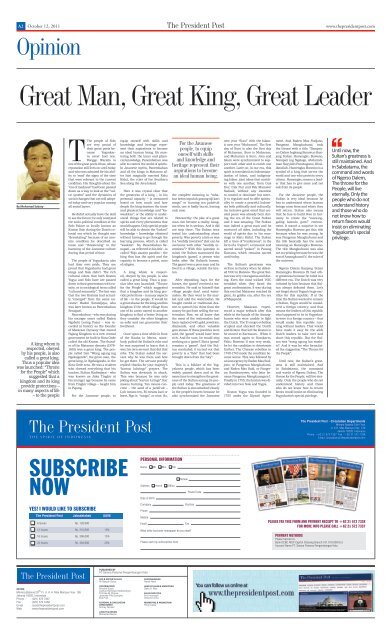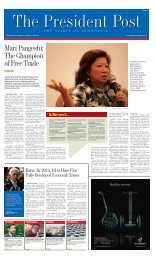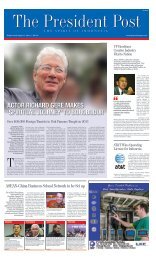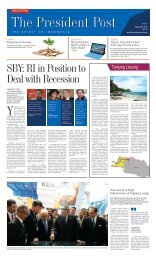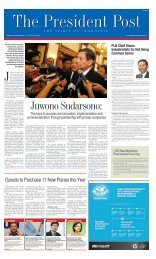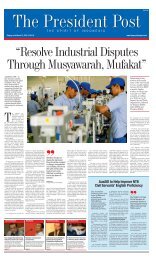28th Edition - The President Post
28th Edition - The President Post
28th Edition - The President Post
You also want an ePaper? Increase the reach of your titles
YUMPU automatically turns print PDFs into web optimized ePapers that Google loves.
A2<br />
October 12, 2011<br />
<strong>The</strong> <strong>President</strong> <strong>Post</strong><br />
www.thepresidentpost.com<br />
Opinion<br />
Great Man, Great King, Great Leader<br />
By Mohamad Sobary<br />
A king whom is<br />
respected, obeyed<br />
by his people, is also<br />
called a great king.<br />
Thus a popular idea<br />
was launched: “Throne<br />
for the People” which<br />
suggested that a<br />
kingdom and its king<br />
provide protections –<br />
in many aspects of life<br />
– to the people<br />
T<strong>The</strong> people of Solo<br />
are very proud of<br />
their great poets because<br />
Yogyakarta<br />
never had one.<br />
Ronggo Warsito is<br />
one of the great poets it has, whose<br />
reputation still lives on until today<br />
and who was admired for his ability<br />
to ‘read’ the signs of the time<br />
that were relevant to the current<br />
condition. His thoughts about the<br />
“era of madness” had been passed<br />
down as a way to look at the “value<br />
system” and the dynamics of<br />
social changes that are still adopted<br />
today and very popular among<br />
all social layers.<br />
He didn’t actually have the skill<br />
to see the future; he only analyzed<br />
the socio-political condition at the<br />
Solo Palace or locally known as<br />
Kraton Solo during the Dutch colonial<br />
era which he thought was<br />
“devastating” because of an anomie<br />
condition he described as<br />
tense and “threatening” to the<br />
harmony of the Javanese culture<br />
during that period of time.<br />
<strong>The</strong> people of Yogyakarta also<br />
had their own pride. <strong>The</strong>y are<br />
proud that Yogyakarta had great<br />
kings and Solo didn’t. <strong>The</strong> rich<br />
cultural colors that both Kraton<br />
Yogya and Solo have are passed<br />
down to their generations with enmity,<br />
or in sociological term called<br />
“cultural animosity”. <strong>The</strong> fact was<br />
that the two Kratons had actually<br />
“emerged” from the same ancestor:<br />
Raden Sutawijaya, who<br />
was later known as Panembahan<br />
Senapati.<br />
Panembahan – who was during<br />
his younger years called Raden<br />
Ngabehi Loring Pasar – was recorded<br />
in history as the founder<br />
of Mataram Dynasty that moved<br />
Pajang Kingdom to a new central<br />
government he built in Kota Gede<br />
called the old Kraton. <strong>The</strong> founder<br />
of the Mataram dynasty (1578-<br />
1601) was a great king. <strong>The</strong> people<br />
called him “Wong agung ing<br />
Ngeksigondo”, the great man, the<br />
great king, in Ngeksigondo, in the<br />
Kota Gede area. He was a student<br />
who chewed everything that his<br />
teacher, Sultan Hadiwijaya – who<br />
was known as Jaka Tingkir at<br />
his younger age because he came<br />
from Tingkir village – taught him<br />
in Pajang.<br />
For the Javanese people, to<br />
equip oneself with skills and<br />
knowledge and heritage represent<br />
their aspirations to become<br />
an ideal human being. By mastering<br />
both the inner and physical<br />
knowledge, Panembahan was<br />
able to control the world of spirits.<br />
In Javanese myths, Panembahan<br />
and all the kings in Mataram after<br />
him magically married Ratu<br />
Kidul, the ruler of the Southern<br />
Sea along the Java Island.<br />
Here it was crystal clear that<br />
the greatness of a king – in his<br />
personal capacity – is measured<br />
based on how much and how<br />
deeply the king masters the inner<br />
and physical knowledge and “kawaskitan”,<br />
or the ability to understand<br />
things that are related to<br />
spirits and every phenomena that<br />
would happen. Only special people<br />
will be able to obtain the “laduni”<br />
knowledge – knowledge obtained<br />
without having to go through the<br />
learning process, which is called<br />
“waskita”. So, Panembahan Senopati<br />
– as reflected in his title – is<br />
called “Rojo asariro pandito – the<br />
king that has the spirit and the<br />
capacity to become a priest, man<br />
of religion.<br />
A king whom is respected,<br />
obeyed by his people, is also<br />
called a great king. Thus a popular<br />
idea was launched: “Throne<br />
for the People” which suggested<br />
that a kingdom and its king provide<br />
protections – in many aspects<br />
of life – to the people. It would be<br />
a great shame for the king and his<br />
kingdom if the whole village from<br />
one of its areas moved to another<br />
kingdom to find a better living as<br />
they consider the other kingdom<br />
as safer and can guarantee their<br />
livelihood.<br />
Once upon a time while in front<br />
of the Kaaba in Mecca, somebody<br />
pulled the Sultan’s robe and<br />
he was surprised to learn that it<br />
was his own servant that did that<br />
robe. <strong>The</strong> Sultan asked his servant<br />
why he was there and how<br />
he got there. <strong>The</strong> servant proudly<br />
replied: thanks for your majesty’s<br />
“karton luhringo” prayers. <strong>The</strong><br />
Sultan was obviously in shock.<br />
This was because he was only<br />
joking about “karton luringo”. Kar<br />
means burning. Ton means concrete<br />
– the seed of a jackfruit –<br />
Luh means ten, Ri means kari or<br />
leave, Ngo is “songo”, or nine. So,<br />
For the Javanese<br />
people, to equip<br />
oneself with skills<br />
and knowledge and<br />
heritage represent their<br />
aspirations to become<br />
an ideal human being.<br />
the complete meaning is: “mbakar<br />
beton sepuluh gosong siji kari<br />
songo” or burning ten jackfruit<br />
seeds, one is badly burnt, leaving<br />
only nine.<br />
Noteworthy: the joke of a great<br />
man can become a reality. Imagine<br />
when he is serious. And it did<br />
not stop there. <strong>The</strong> Sultan once<br />
tested his understanding about<br />
poverty. Was poverty a fate or was<br />
it a “worldly invention” that can be<br />
overcome with other “worldly inventions”?<br />
With this question in<br />
mind, the Sultan summoned the<br />
kingdom’s ‘gamel’, a person who<br />
looks after the Sultan’s horses.<br />
<strong>The</strong> gamel was a poor man and he<br />
lived in a village, outside the kraton.<br />
After depositing hays for the<br />
horses, the ‘gamel’ received a watermelon.<br />
He said to himself that<br />
village people don’t need watermelon.<br />
He then went to the market<br />
and sold the watermelon. He<br />
bought cendol or traditional dessert<br />
to quench his thirst from the<br />
money he got from selling the watermelon.<br />
Now, we all know that<br />
the meat of the watermelon had<br />
been replaced with gold, jewelries,<br />
diamonds, and other valuable<br />
gem stones. If these jewelries were<br />
sold, the ‘gamel’ would have been<br />
rich. And for sure, he would stop<br />
working as a ‘gamel’. But a ‘gamel’<br />
remains a ‘gamel’. And the Sultan<br />
concluded: it turned out that<br />
poverty is a “fate” that had been<br />
brought down from the “sky”.<br />
This is a folklore of the Yogyakarta<br />
people, which has been<br />
widely passed down and at the<br />
same time to strengthen the greatness<br />
of the Sultan among its people<br />
until today. <strong>The</strong> greatness of<br />
the Sultan is also attached closely<br />
in the people’s hearts because he<br />
also synchronized the Javanese<br />
new year “Suro” with the Islamic<br />
new year “Muharam”. <strong>The</strong> first<br />
day of Suro is also the first day<br />
of Muharam. Suro is Muharam,<br />
and Muharam is Suro. Java and<br />
Islam were synchronized to support<br />
each other and to enrich one<br />
another. Later on, in our era, this<br />
spirit is translated as Indonesianization<br />
of Islam, and indigenizing<br />
Islam: joint ideas that matches<br />
with one another, from Gus<br />
Dur, Cak Nur and Pak Munawir<br />
Sadzali, without any intention<br />
to control or dominate but merely<br />
to regulate and to offer spirituality<br />
to create a peaceful Indonesia<br />
both politically and culturally.<br />
An inclusive great mind that created<br />
peace was already born during<br />
the era of the Great Sultan<br />
and it was amazing. <strong>The</strong> Sultan<br />
was indeed a great man and he<br />
nurtured all sides, including the<br />
world of spirits due to his marriage<br />
to Ratu Kidul. <strong>The</strong> Sultan<br />
left a trace of “rendezvous”, in the<br />
form of a ‘Cepuri”, a romantic and<br />
sacred small “palace” in Parang<br />
Kusumo, which remains sacred<br />
until today.<br />
<strong>The</strong> Sultan’s greatness was<br />
written in history when he defeated<br />
VOC in Batavia. <strong>The</strong> great Sultan<br />
was very courageous and daring.<br />
Even the most wicked VOC<br />
trembled when they faced the<br />
great confrontation. It was during<br />
this era that Mataram reached its<br />
glory, its golden era, after the era<br />
of Majapahit.<br />
However, Mataram experienced<br />
a major setback after this<br />
while in the hands of the Amangkurats<br />
who were unable to fight<br />
the Dutch. <strong>The</strong> Trunojyo rebellion<br />
erupted and shocked the Dutch<br />
and Kraton that led the Kraton to<br />
be moved to Kartosuro. When it<br />
was moved again to Surokarto,<br />
Paku Buwono II was very weak,<br />
he let the condition to deteriorate<br />
further. <strong>The</strong> Chinese rebellion in<br />
1740-1743 made the condition become<br />
worse. This was followed by<br />
an insurgency by Raden Mas Sudjono,<br />
or Pangeran Mangkubumi,<br />
and Raden Mas Said, or Pangeran<br />
Sambernyowo, who later became<br />
Pangeran Mangkunegara I.<br />
Finally in 1755, the kraton was divided<br />
into two: Solo and Yogya.<br />
Kraton Yogya was founded in<br />
1755 under the Giyanti Agreement.<br />
And Raden Mas Sudjono,<br />
Pangeran Mangkubumi, took<br />
the throne with a title: “Sampeyan<br />
Dalem Ingkang Sinuwun Kanjeng<br />
Sultan Hamengku Buwono,<br />
Senopati ing Ngalogo, Abdurrahman<br />
Sayyidin Panotogomo, Khalifatullah.<br />
Hamengku Buwono is a<br />
symbol of a king that serves the<br />
world and one who protects every<br />
citizen. Hamengku means a leader<br />
that has to give more and not<br />
ask from its people.<br />
For the Javanese people, the<br />
Sultan is very ideal because he<br />
has to understand where human<br />
beings come from and where they<br />
will return. Sultan also means<br />
that he has to build lives in harmony<br />
to create the “manunggaling<br />
kawulo gusti” environment.<br />
It wasn’t a surprise to see<br />
Hamengku Buwono got this title<br />
because when he was young; he<br />
was Pangeran Mangkubumi and<br />
the title basically has the same<br />
meaning as Hamengku Buwono.<br />
<strong>The</strong> title Mangkubumi was also<br />
not surprising because he was the<br />
son of Amangkurat IV, the ruler of<br />
the universe.<br />
Ngerso Dalem Kanjeng Sulan<br />
Hamengku Buwono IX had other<br />
greatness because he ruled in a<br />
different era. <strong>The</strong> Dutch was very<br />
irritated by him because this Sultan<br />
always defeated them. Let’s<br />
not forget about Yogya’s huge sacrifice<br />
for this republic. If at the<br />
time the Sultan wanted to remain<br />
a Sultan, Yogya would be considered<br />
a foreign country, and that<br />
means the leaders of this republic<br />
who happened to be in Yogyakarta<br />
were in a foreign country – that<br />
would make this republic running<br />
without leaders. That would<br />
have made it easy for the slick<br />
Dutch leaders to take over and<br />
abort this republic. But the Sultan<br />
was “wong agung lan waskito”.<br />
And it was he who formulated<br />
the suggestion “<strong>The</strong> Throne for<br />
the People”.<br />
Until now, the Sultan’s greatness<br />
is still maintained. And<br />
in Sabdatama, the command<br />
and words of Ngerso Dalem, <strong>The</strong><br />
throne for the People, will live eternally.<br />
Only the people who do not<br />
understand history and those<br />
who do not know how to return<br />
favors would insist on eliminating<br />
Yogyakarta’s special privilege.<br />
Until now, the<br />
Sultan’s greatness is<br />
still maintained. And<br />
in Sabdatama, the<br />
command and words<br />
of Ngerso Dalem,<br />
<strong>The</strong> throne for the<br />
People, will live<br />
eternally. Only the<br />
people who do not<br />
understand history<br />
and those who do<br />
not know how to<br />
return favors would<br />
insist on eliminating<br />
Yogyakarta’s special<br />
privilege.<br />
<strong>The</strong> <strong>President</strong> <strong>Post</strong><br />
THE SPIRIT OF INDONESIA<br />
<strong>The</strong> <strong>President</strong> <strong>Post</strong> - Circulation Departments<br />
Menara Batavia 25th Floor<br />
Jl. K.H. Mas Mansyur Kav. 126<br />
Jakarta 10220, Indonesia<br />
Phone: +62 21 572 7337 Fax.: +62 21 572 7338<br />
Email: circulation@thepresidentpost.com<br />
SUBSCRIBE<br />
NOW<br />
PERSONAL INFORMATION<br />
Name Mr Mrs Ms<br />
Renew<br />
Address Home Office<br />
<strong>Post</strong>al Code<br />
Date of Birth<br />
YES! I WOULD LIKE TO SUBSCRIBE<br />
<strong>The</strong> <strong>President</strong> <strong>Post</strong> Jabodetabek<br />
6 Issues<br />
Rp. 120,000<br />
12 Issues<br />
Rp. 216,000<br />
18 Issues<br />
Rp. 306,000<br />
24 Issues<br />
Rp. 384,000<br />
SAVE<br />
-<br />
10%<br />
15%<br />
20%<br />
Company<br />
Position<br />
Phone<br />
Mobile<br />
Email<br />
Fax<br />
What other business newspaper do you read?<br />
Please start my subscription from<br />
PLEASE FAX THIS FORM AND PAYMENT RECEIPT TO +62 21 572 7338<br />
FOR MORE INFO PLEASE CALL +62 21 572 7337<br />
PAYMENT METHODS<br />
Please transfer to:<br />
Bank OCBC NISP Capitol Cikarang Branch 101.010.00016.5<br />
Account Name PT. Sarana Pratama Pengembangan Kota<br />
<strong>The</strong> <strong>President</strong> <strong>Post</strong><br />
OFFICE<br />
Menara Batavia 25 th Fl. Jl. K.H. Mas Mansyur Kav. 126<br />
Jakarta 10220, Indonesia<br />
Phone : (021) 572 7337<br />
Fax : (021) 572 7338<br />
Email : ceo@thepresidentpost.com<br />
Web : www.thepresidentpost.com<br />
PUBLISHED BY<br />
PT Sarana Pratama Pengembangan Kota<br />
CEO & EDITOR IN CHIEF<br />
Ali Basyah Suryo<br />
CONTRIBUTORS<br />
Atmono Suryo<br />
Cyrillus Harinowo Hadiwerdoyo<br />
Thomas W. Shreve<br />
Jeannifer Filly Sumayku<br />
Eka Putri<br />
EDITORIAL & CIRCULATION<br />
DEPARTMENT<br />
Srimay Noviani<br />
LAYOUT & DESIGN<br />
Mohamad Akmal<br />
PHOTOGRAPHER<br />
Nandi Nanti<br />
HEAD OF SALES & MARKETING<br />
Detia H. Rais<br />
SALES EXECUTIVE<br />
Erni Imansyah<br />
Vesovio Lonco<br />
MARKETING & PROMOTION<br />
Fenty Lisary


